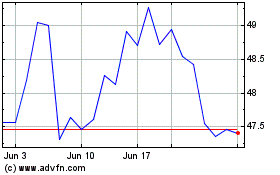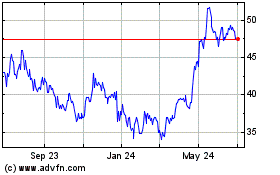Stocks Drop Across Asia After U.S. Swoon -- Update
December 05 2018 - 4:43AM
Dow Jones News
By Saumya Vaishampayan
A tumble in U.S. stocks spilled into Asia on Wednesday, sending
markets down by more than 1% in Hong Kong and Taiwan.
The broad declines came after the Dow Jones Industrial Average
notched its worst daily performance in nearly two months, slumping
3.1%.
Elation over the temporary trade standoff between the U.S. and
China, which fueled a surge in markets earlier this week, has given
way to renewed concerns about global growth if the two countries
cannot resolve their differences.
Moves in the U.S. Treasury market also rattled investors. The
yield curve has continued to flatten in recent days, with the
closely watched gap between yields on two-year and 10-year Treasury
notes at its smallest since 2007. Short-term rates rising above
their long-term counterparts, known as an inverted yield curve,
sends a gloomy signal about growth: an inversion has preceded each
U.S. recession since 1975.
In Asia, technology stocks fell more than the broader market.
Shares of Tencent Holdings Ltd. lost 2.3% while Samsung Electronics
Co. fell 1.7%, outpacing declines of 1.6% and 0.6% in Hong Kong and
South Korea, respectively. Sunny Optical Technology Group Co. and
AAC Technologies Holdings Inc., which make components for
smartphones, were some of the worst performers in Hong Kong's Hang
Seng.
Taiwan's index was one of the worst hit, down 1.7%, while the
Shanghai Composite lost 0.6%. Japan's Nikkei fell 0.5%.
Investors also ran away from risk in currency markets, with the
dollar rising against the Indonesian rupiah, Australian dollar and
Chinese yuan.
Still, Wednesday's pullback in Asian stocks was smaller than the
U.S. swoon. Sean Darby, global equity strategist at Jefferies in
Hong Kong, said that was partly because regional stocks had already
sold off more sharply this year. "We've already been down and out
for quite a while," he said.
This year, the Shanghai Composite has slumped 20%, Korea's Kospi
has lost 15% and the Hang Seng has tumbled 10%. The Dow and S&P
500 are both still up, even after Tuesday's declines.
Weak Chinese data has boosted investor expectations for more
policy responses like as tax cuts or higher infrastructure
spending--which could lift corporate profits not just in China but
around the region.
Such moves to cushion Chinese growth are one reason why Evan
Brown, head of macro asset allocation strategy at UBS Asset
Management, has become more positive on the prospects for non-U. S.
stocks next year. He said he has added to emerging-market
investments in recent months because shares in these countries look
cheap.
Write to Saumya Vaishampayan at saumya.vaishampayan@wsj.com
(END) Dow Jones Newswires
December 05, 2018 04:28 ET (09:28 GMT)
Copyright (c) 2018 Dow Jones & Company, Inc.
Tencent (PK) (USOTC:TCEHY)
Historical Stock Chart
From Mar 2024 to Apr 2024

Tencent (PK) (USOTC:TCEHY)
Historical Stock Chart
From Apr 2023 to Apr 2024
